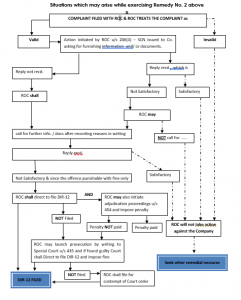Author – CS Gurminder Dhami (Firm- Gurminder Dhami & Associates from New Delhi, IN).
The nitty-gritty involved while resignation from the post of Director of a Company, precautions to be taken while resigning have been discussed by the author is separate articles link of which have been provided above.
Now, despite of all the precautions taken there are chances that a Company is not filing the e-form DIR-12 with ROC.
This article focuses on remedies available with a resigning Director in case the Company is not filing e-form DIR-12 with ROC.
Remedies
The remedies given herein below are according to the author, put in a logical sequence and therefore it is advisable to exhaust the first remedy and even if still the issue persists then move on to the next available remedy.
Remedy 1 – File e-form DIR-11 with ROC & Send correspondence to the Company
In case the Company has not filed with ROC e-form DIR-12 intimating resignation within the stipulated time period of 30 days in Section 168 of Companies Act, 2013, the resigning Director should immediately proceed for filing e-form DIR-11, if not already filed.
Thereafter, the resigning Director may serve the Company and all its Directors with a reminder letter along with the copy of e-form DIR-11 filed with ROC.
(FORMAT of a sample reminder letter is placed at this weblink)
Remedy 2 – File complaint with ROC in e-form SCP (Serious Complaint Form)
That even after sending of reminder letter to the Company, the Company has not filed e-form DIR-12 with ROC, then the resigning Director should file e-form SCP (Serious Complaint Form) with ROC. The e-form SCP allows a resigning Director to file complaint against the Company who is not filing the resignation of Director.
The practical guide as to information required to be mentioned in the e-form SCP is as follows:-
| Particulars of e-form SCP | Values
|
| Details of the Complainant | Name, Address, Phone & e-mail id.
|
| Details of the Company | Enter CIN to pre-fill details.
|
| Nature of Complaint
|
Select the option “Cessation of director” |
| Status of Complainant
|
Select the option “Other” |
| Particulars of Resigning Director | Enter DIN & pre-fill, enter Designation, e-mail id, reasons of cessation and other remarks, if any.
|
| Particulars of Complaint | Enter the details of the complaint being made in brief here along with other remarks, if any.
|
| Attachments | 1. ID Proof of Complainant.
2. Correspondence with Company regarding the resignation. |
Here it is advisable to prepare a complaint letter and explain all the facts therein and attach all the relevant documents to substantiate the complaint. In this letter ROC should be requested to initiate appropriate actions against the Company (call information & documents u/s 206, direct to file e-form DIR-12 and also adjudicate penalty for the default u/s 454)
(FORMAT of a sample complain letter to be filed with ROC is placed at this weblink)
Thereafter, it is advisable to submit physical copies of all the above documents with form SCP and challan with ROC office, make representation and follow-up the matter with ROC so that the ROC takes action in this regard.
Situations which may arise while exercising Remedy No. 2 above described in the below picture :-

Remedy 3 – Send a legal notice to the Company
That while pursuing as per remedy 3 above, it comes to conclusion that the ROC will not take action against the Company (refer chart above) and if the Company has still not filed with ROC e-form DIR-12, then it is advisable that before instituting legal proceedings, a legal notice is sent to the Company and all its Directors.
It is always advisable to send a legal notice first before institution of legal proceedings because litigation is costly and lengthy affair.
Also sending a legal notice reduces the initial time taken at Court / Tribunal proceedings during admission of the case because –
– the respondent(s) are aware of the fact that a case maybe be filed against them, if they do not resolve the issue and thus may not ask for time from the Court / Tribunal to file their reply.
-The Court / Tribunal would also in this case, not be inclined to give the respondents lengthy time to file their reply.
(FORMAT of a sample legal notice to be sent to the Company is placed at the following weblink)
Remedy 4 – File Petition with Hon’ble NCLT
Despite all the tedious and rigours efforts if the Company still does not file e-form DIR-12, then the resigning Director should drag the Company to the appropriate legal forum to seek justice. Here the resigning Director should also demand for damages, litigation costs and compensation for harassment and mental agony.
The resigning Director in the petition under Section 168 and Section 170 read with Section 172 should, inter-alia, seek the following relief(s) :-
- To direct the respondent(s) to file e-form DIR-12 with the office of Registrar of Companies.
- To direct the respondent(s) to place the fact of petitioner(s) resignation on the website of the Company.
- To direct the respondent(s) to intimate the fact of petitioner(s) resignation to all the bankers, vendors, dealers, agents and other stakeholders.
- To take appropriate penal actions against the respondents for non compliance of Section 168 and Section 170 read with Section 172, for not filing the e-form DIR-12 within stipulated time period and for not making entries of particulars of resignation in register of Director.
- To take appropriate penal actions against the respondents for non compliance of Section 189 for not making entries of particulars provided by the petitioner Director u/s 189(2) in the register of contracts or arrangements in which directors are interested.
- To take appropriate penal actions against the respondents for non compliance of Section 134 read with Section 168, for not mentioning the fact of resignation of petitioner in the ensuing Board’s Report layed at the AGM.
- To direct the respondents to revise the Board’s report in compliance with the provisions of the Companies Act, 2013 and also intimate all the shareholders about the fact of resignation of petitioner.
- To take appropriate penal actions against the respondents for non compliance of Section 92, for not mentioning the fact of resignation of petitioner in the Annual Return (MGT-7) with ROC.
- To direct the respondents to revise the Annual Return (MGT-7) and file the revised return with ROC.
- To direct the respondents to pay a sum of Rs. ——————— /- as damages and harassment and Rs. —————————–/- towards the litigation costs.
- To direct the respondents to keep the petitioner indemnified at all times, against all liabilities including cost of defending any proceedings, which might arise from any proceeding filed by any person against the petitioner, believing the petitioner to be a Director in the Company during the period starting from the date of actual resignation of the petitioner and till the date of filing of e-form DIR-12 by the Company.
Note of thanks to our Author – RiSiko would like to offer word of thanks to CS Gurminder Dhami (Firm- Gurminder Dhami & Associates from New Delhi, IN) for this valuable contributions on this critical topic. You can reach out to him for any Queries/suggestions or Questions at csgurminderdhami@gmail.com
Disclaimer: The entire contents of this article have been prepared on the basis of relevant provisions, judgements and information existing at the time of preparation. The observations of the author are personal view and the author does not take any responsibility of the same and this cannot be quoted without the written consent of the author.
 Online Enquiry
Online Enquiry
 Useful Links
Useful Links


